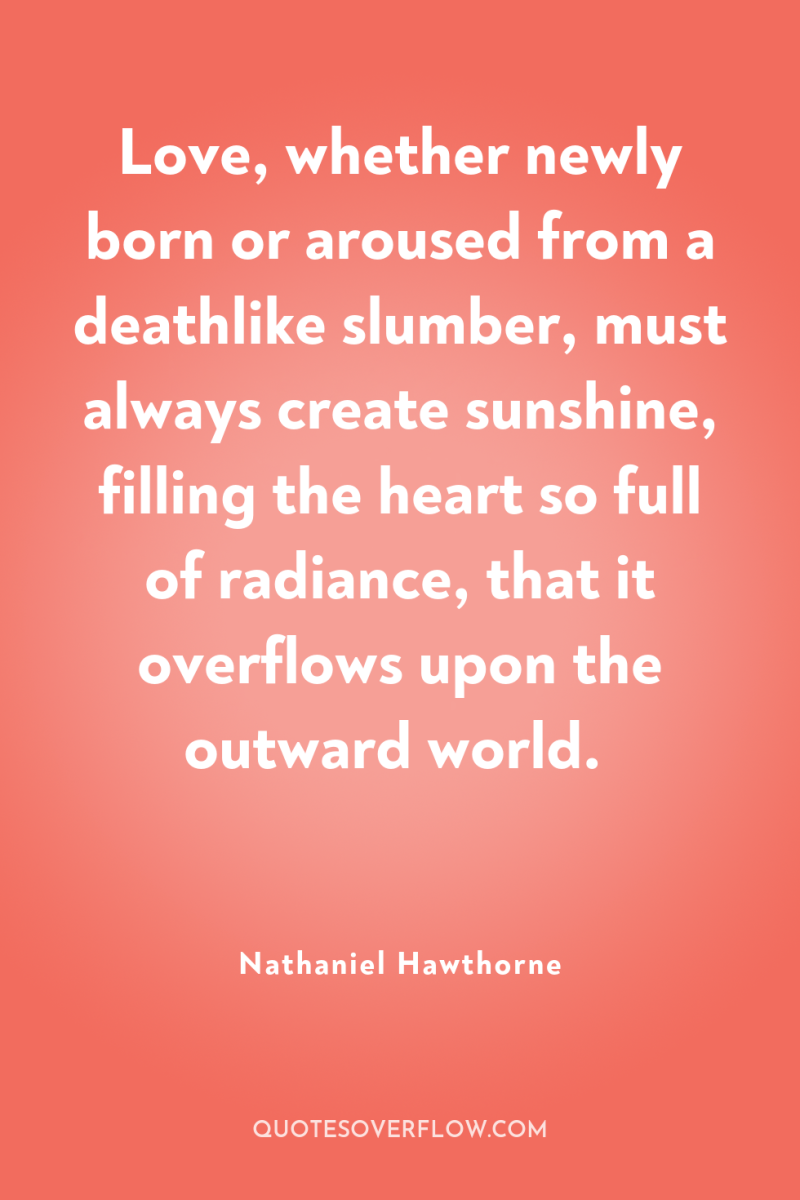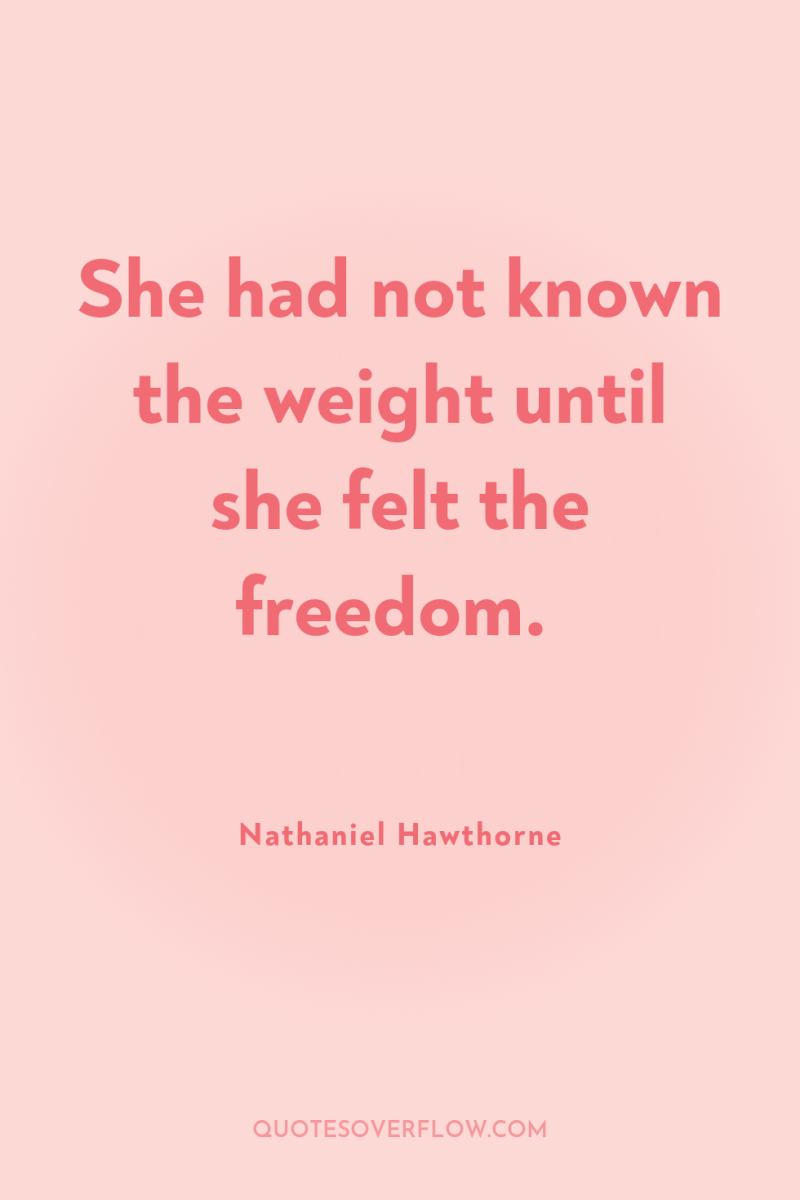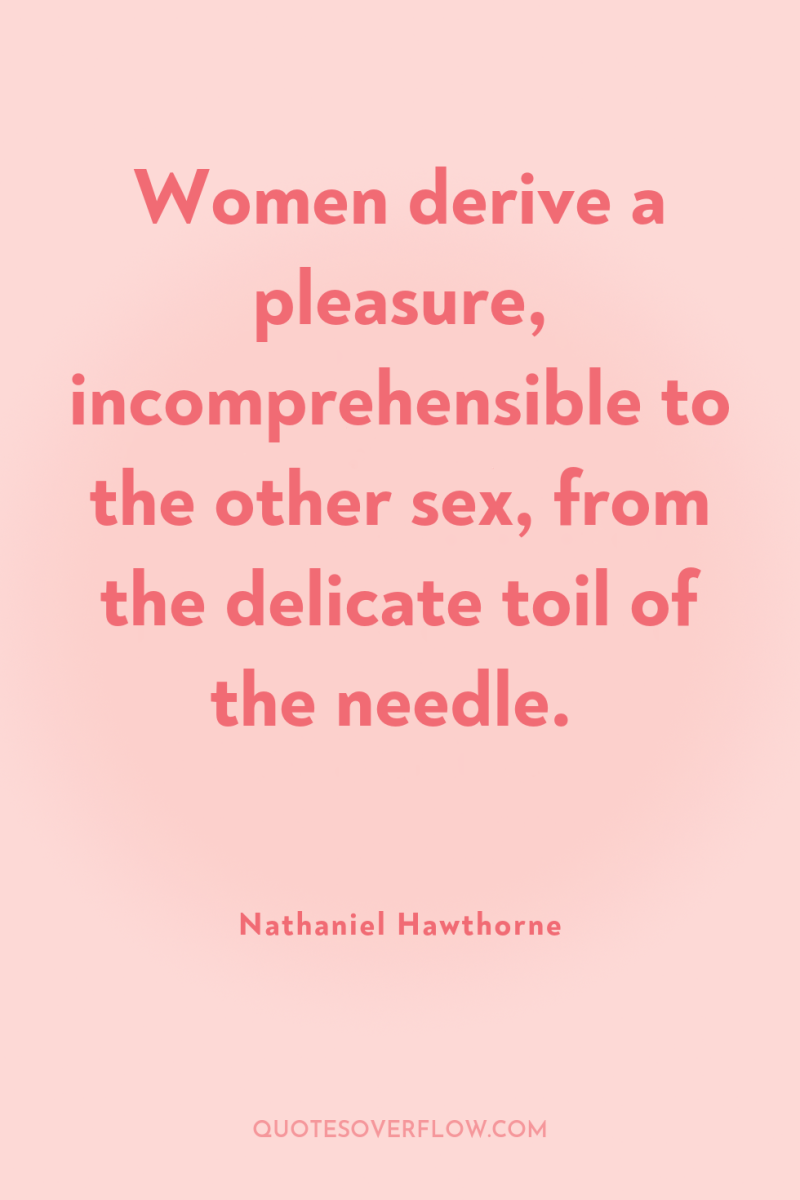
1
Love, whether newly born or aroused from a deathlike slumber, must always create sunshine, filling the heart so full of radiance, that it overflows upon the outward world.Nathaniel Hawthorne
2
When an uninstructed multitude attempts to see with its eyes, it is exceedingly apt to be deceived. When, however, it forms its judgment, as it usually does, on the intuitions of its great and warm heart, the conclusions thus attained are often so profound and so unerring as to possess the character of truth supernaturally revealed.Nathaniel Hawthorne
3
There can be, if I forebode aright, no power, short of the Divine mercy, to disclose, whether by uttered words, or by type or emblem, the secrets that may be buried with a human heart. The heart, making itself guilty of such secrets, must perforce hold them, until the day when all hidden things shall be revealed. Nor have I so read or interpreted the Holy Writ, as to understand that the disclosure of human thoughts and deeds, then to be made, is intended as part of the retribution. That, surely, were a shallow view of it. No; these revelations, unless I greatly error, are meant merely to promote the intellectual satisfaction of all intelligent beings, who will stand waiting, on that day, to see the dark problem of this life made plain. A knowledge of men's hearts will be needful to the completest solution of that problem. And I conceive, moreover, that the hearts holding such secrets as you speak of will yield them up, at that last day, not with reluctance, but with a joy unutterable. .Nathaniel Hawthorne
4
...the Puritans compressed whatever mirth and public joy they deemed allowable to human infirmity; thereby so far dispelling the customary cloud, that, for the space of a single holiday, they appeared scarcely more grave than most other communities at a period of general affliction.Nathaniel Hawthorne

5
She had not known the weight until she felt the freedom.Nathaniel Hawthorne
6
The scarlet letter was her passport into regions where other women dared not tread.Nathaniel Hawthorne

7
Women derive a pleasure, incomprehensible to the other sex, from the delicate toil of the needle.Nathaniel Hawthorne
8
He was not ill-fitted to be the head and representative of a community which owed its origin and progress, and its present state of development, not to the impulses of youth, but to the stern and tempered energies of manhood and the sombre sagacity of age; accomplishing so much, precisely because it imagined and hoped so little.Nathaniel Hawthorne
9
Some attribute had departed from her, the permanence of which had been essential to keep her a woman. Such is frequently the fate, and such the stern development, of the feminine character and person, when the woman has encountered, and lived through, an experience of peculiar severity. If she be all tenderness, she will die. If she survive, the tenderness will either be crushed out of her, or–and the outward semblance is the same–crushed so deeply into her heart that it can never show itself more. .Nathaniel Hawthorne
10
Let men tremble to win the hand of woman, unless they win along with it the utmost passion of her heart!Nathaniel Hawthorne
11
Like all other music, it breathed passion and pathos, and emotions high or tender, in a tongue native to the human heart, wherever educated.Nathaniel Hawthorne
12
It is a curious subject of observation and inquiry, whether hatred and love be not the same thing at bottom. Each, in its utmost development, supposes a high degree of intimacy and heart-knowledge; each renders one individual dependent for the food of his affections and spiritual life upon another; each leaves the passionate lover, or the no less passionate hater, forlorn and desolate by the withdrawal of his object.Nathaniel Hawthorne
13
The sorrow that lay cold in her mother's heart... converted it into a tomb.Nathaniel Hawthorne
14
Do anything, save to lie down and die!Nathaniel Hawthorne
15
In the little chaos of Pearl's character there might be seen emerging-and could have been from the very first-the steadfast principles of an unflinching courage-an uncontrollable will-a sturdy pride which might be disciplined into self-respect-and a bitter scorn of many things, which, when examined, might be found to have the taint of falsehood in them.Nathaniel Hawthorne
16
There are many things in this world that a child must not ask about.Nathaniel Hawthorne
17
Would not the earth, quickened to an evil purpose by the sympathy of his eye, greet him with poisonous shrubs... Would he not suddenly sink into the earth, leaving a barren and blasted spot, where, in due course of time, would be seen deadly nightshade, dogwood, henbane, and whatever else of vegetable wickedness the climate could produce, all flourishing with hideous luxuriance?Nathaniel Hawthorne
18
In all her intercourse with society, however, there was nothing that made her feel as if she belonged to it... She stood apart from mortal interests, yet close beside them, like a ghost that revisits the familiar fireside, and can no longer make itself seen or felt.Nathaniel Hawthorne
19
There was a listlessness in his gait, as if he saw no reason for taking one step further, nor felt any desire to do so, but would have been glad, could he be glad of anything, to fling himself down at the root of the nearest tree, and lie there passive for evermore. The leaves might bestrew him, and the soil gradually accumulate and form a little hillock over his frame, no matter whether there were life in it or no. Death was too definite an object to be wished for or avoided.Nathaniel Hawthorne
20
Trusting no man as his friend, he could not recognize his enemy when the latter actually appeared.Nathaniel Hawthorne
21
Pluck up a spirit, and do not be all the time sighing and murmuring!Nathaniel Hawthorne
22
I have laughed, in bitterness and agony of heart, at the contrast between what I seem and what I am!Nathaniel Hawthorne
23
It was one of those moments–which sometimes occur only at the interval of years–when a man's moral aspect is faithfully revealed to his mind's eye. Not improbably, he had never before viewed himself as he did now.Nathaniel Hawthorne
24
Preach! Write! Act! Do any thing, save to lie down and die!Nathaniel Hawthorne
25
She had wandered, without rule or guidance, into a moral wilderness.. Her intellect and heart had their home, as it were, in desert places, where she roamed as freely as the wild Indian in his woods.. The scarlet letter was her passport into regions where other women dared not tread. Shame, Despair, Solitude! These had been her teachers–stern and wild ones–and they had made her strong, but taught her much amiss. .Nathaniel Hawthorne
26
...Chillingworth was a striking evidence of man's faculty of transforming himself into a devil, if he will only, for a reasonable space of time, undertake a devil's office.Nathaniel Hawthorne
27
He had been driven hither by the impulse of that Remorse which dogged him everywhere, and whose own sister and closely linked companion was that Cowardice which invariably drew him back, with her tremulous gripe, just when the other impulse had hurried him to the verge of a disclosure.Nathaniel Hawthorne
28
To the untrue man, the whole universe is false--it is impalpable--it shrinks to nothing within his grasp.Nathaniel Hawthorne
29
Many people are seeking, at this very moment, to shelter themselves under the wing of the federal eagle; imagining, I presume, that her bosom has all the softness and snugness of an eider-down pillow. But she has no great tenderness, even in her best of moods, and, sooner or later, --oftener sooner than late, -- is apt to fling off her nestlings with a scratch of her claw, a dab of her beak, or a rankling wound from her barbed arrows.Nathaniel Hawthorne
30
Be it sin or no, I hate the man!Nathaniel Hawthorne
31
Had there been a Papist among the crowd of Puritans, he might have seen in this beautiful woman, so picturesque in her attire and mien, and with the infant at her bosom, an object to remind him of the image of Divine Maternity, which so many illustrious painters have vied with one another to represent; something which should remind him, indeed, but only by contrast, of that sacred image of sinless motherhood, whose infant was to redeem the world. Here, there was the taint of of deepest sin in the most sacred of quality of human life, working such effect, that the world was only the darker for this woman's beauty, and the more lost for the infant that she had borne.Nathaniel Hawthorne
32
...such loss of faith is ever one of the saddest results of sin.Nathaniel Hawthorne
33
O Fiend, whose talisman was that fatal symbol, wouldst thou leave nothing, whether in youth or age, for this poor sinner to revere?–such loss of faith is ever one of the saddest results of sin.Nathaniel Hawthorne
34
I had ceased to be a writer of tolerably poor tales and essays, and had become a tolerably good Surveyor of the Customs. That was all. But, nevertheless, it is any thing but agreeable to be haunted by a suspicion that one's intellect is dwindling away; or exhaling, without your consciousness, like ether out of a phial; so that, at every glance, you find a smaller and less volatile residuum. Of the fact, there could be no doubt; and, examining myself and others, I was led to conclusions in reference to the effect of public office on the character, not very favorable to the mode of life in question. In some other form, perhaps, I may hereafter develop these effects. Suffice it here to say, that a Custom-House officer, of long continuance, can hardly be a very praiseworthy or respectable personage, for many reasons; one of them, the tenure by which he holds his situation, and another, the very nature of his business, which–though, I trust, an honest one–is of such a sort that he does not share in the united effort of mankind. An effect–which I believe to be observable, more or less, in every individual who has occupied the position–is, that, while he leans on the mighty arm of the Republic, his own proper strength departs from him. He loses, in an extent proportioned to the weakness or force of his original nature, the capability of self-support. If he possess an unusual share of native energy, or the enervating magic of place do not operate too long upon him, his forfeited powers may be redeemable. The ejected officer–fortunate in the unkindly shove that sends him forth betimes, to struggle amid a struggling world–may return to himself, and become all that he has ever been. But this seldom happens. He usually keeps his ground just long enough for his own ruin, and is then thrust out, with sinews all unstrung, to totter along the difficult footpath of life as he best may. Conscious of his own infirmity, –that his tempered steel and elasticity are lost, –he for ever afterwards looks wistfully about him in quest of support external to himself. His pervading and continual hope–a hallucination, which, in the face of all discouragement, and making light of impossibilities, haunts him while he lives, and, I fancy, like the convulsive throes of the cholera, torments him for a brief space after death–is, that, finally, and in no long time, by some happy coincidence of circumstances, he shall be restored to office. This faith, more than any thing else, steals the pith and availability out of whatever enterprise he may dream of undertaking. Why should he toil and moil, and be at so much trouble to pick himself up out of the mud, when, in a little while hence, the strong arm of his Uncle will raise and support him? Why should he work for his living here, or go to dig gold in California, when he is so soon to be made happy, at monthly intervals, with a little pile of glittering coin out of his Uncle's pocket? It is sadly curious to observe how slight a taste of office suffices to infect a poor fellow with this singular disease. Uncle Sam's gold–meaning no disrespect to the worthy old gentleman–has, in this respect, a quality of enchantment like that of the Devil's wages. Whoever touches it should look well to himself, or he may find the bargain to go hard against him, involving, if not his soul, yet many of its better attributes; its sturdy force, its courage and constancy, its truth, its self-reliance, and all that gives the emphasis to manly character.Nathaniel Hawthorne
35
Calm, gentle, passionless as he appeared, there was yet, we fear, a quiet depth of malice, hitherto latent, but active now, in this unfortunate old man, which led him to imagine a more intimate revenge than any mortal had ever wreaked upon an enemy.Nathaniel Hawthorne
36
In either case, there was very much the same solemnity of demeanour on the part of the spectators, as befitted a people among whom religion and law were almost identical, and in whose character both were so thoroughly interfused, that the mildest and severest acts of public discipline were alike made venerable and awful.Nathaniel Hawthorne
37
It is a curious subject of observation and inquiry, whether hatred and love be not the same thing at bottom. Each, in its utmost development, supposes a high degree of intimacy and heart-knowledge; each renders one individual dependent for the food of his affections and spiritual fife upon another: each leaves the passionate lover, or the no less passionate hater, forlorn and desolate by the withdrawal of his subject. Philosophically considered, therefore, the two passions seem essentially the same, except that one happens to be seen in a celestial radiance, and the other in a dusky and lurid glow.Nathaniel Hawthorne
38
It is the unspeakable misery of a life so false as his, that it steals the pith and substance out of whatever realities there are around us, and which were meant by Heaven to be the spirit’s joy and nutriment. To the untrue man, the whole universe is false–it is impalpable–it shrinks to nothing within his grasp. And he himself in so far as he shows himself in a false light, becomes a shadow, or, indeed, ceases to exist.Nathaniel Hawthorne
39
The horrible ugliness of this exposure of a sick and guilty heart to the very eye that would gloat over it!Nathaniel Hawthorne
40
And Pearl, stepping in, mid-leg deep, beheld her own white feet at the bottom, while out of a still lower depth came the gleam of a kind of fragmentary smile, floating to and fro in the agitated water.Nathaniel Hawthorne